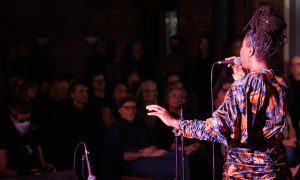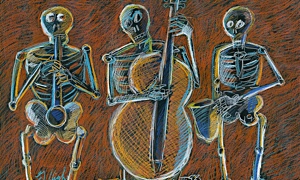Home » Jazz Articles » What is Jazz? » What Is Jazz Music About? The Search Continues...
What Is Jazz Music About? The Search Continues...
What are the defining characteristics of jazz?
After all the searching, only a handful of elements exist that musicians and experts commonly accept as defining characteristics of jazz.- Swing and syncopation
- Improvisation
- Bent notes and innovative modes
- Distinctive voices
Who is the father of jazz?
Louis Armstrong. Louis Armstrong was born in a poor section of New Orleans known as "the Battlefield" on August 4, 1901. By the time of his death in 1971, the man known around the world as Satchmo was widely recognized as a founding father of jazz—a uniquely American art form.What is the most important element of jazz?
Jazz has all the elements that other music has: It has melody; that's the tune of the song, the part you're most likely to remember. It has harmony, the notes that make the melody sound fuller. It has rhythm, which is the heartbeat of the song. But what sets jazz apart is this cool thing called improvisation.Who first invented jazz music?
Buddy Bolden. Others say jazz was born in 1895, the year Buddy Bolden started his first band. Still others say it happened in 1917, when Nick LaRocca and his Original Dixieland Jazz Band recorded the first jazz record, "Livery Stable Blues." But Ferdinand "Jelly Roll" Morton had his own theory.What is the most important element of jazz?
Jazz has all the elements that other music has: It has melody; that's the tune of the song, the part you're most likely to remember. It has harmony, the notes that make the melody sound fuller. It has rhythm, which is the heartbeat of the song. But what sets jazz apart is this cool thing called improvisation.What are the elements of jazz?
The key elements of Jazz include: blues, syncopation, swing and creative freedom. Improvisation in music is not new, as there are traditions of improvisation in India, Africa, and Asia. Beethoven, Mozart and Bach all improvised, as well, but Jazz improvisation is special due to the use of the blues scale.What are the elements of jazz? The key elements of Jazz include: blues, syncopation, swing and creative freedom. Improvisation in music is not new, as there are traditions of improvisation in India, Africa, and Asia. Beethoven, Mozart and Bach all improvised, as well, but Jazz improvisation is special due to the use of the blues scale.Why is it called jazz?
The word "jazz" probably derives from the slang word "jasm,"which originally meant energy, vitality, spirit, pep. The Oxford English Dictionary, the most reliable and complete record of the English language, traces "jasm" back to at least 1860: J. G. Holland Miss Gilbert's Career xix.Why did jazz become popular?
Because of its popularity in speakeasies, illegal nightclubs where alcohol was sold during Prohibition, and its proliferation due to the emergence of more advanced recording devices, jazz became very popular in a short amount of time, with stars including Duke Ellington, Cab Calloway, and Chick Webb.How do you describe jazz?
American music developed especially from ragtime and blues and characterized by propulsive syncopated rhythms, polyphonic ensemble playing, varying degrees of improvisation, and often deliberate distortions of pitch and timbre.Why is jazz so relaxing?
Since stress is the root of many health problems, the relaxing effect of jazz music can have incredible healing influence. It physically changes your body by lowering your heart and respiratory rate. Listening to music (jazz included) directly after a stroke improves verbal memory, focus and mood.Why is jazz so cool?
Because of jazz's pulsating, rhythmic pattern, our brains tend to mimic the improvisation, and we will see that through increased neural stimulation. Jazz music has been known to help you concentrate and think better. The lack of words and the rhythm of jazz makes it the perfect music to study to or get work done.How did jazz changed the world?
Throughout the 1920s, jazz music evolved into an integral part of American popular culture. Jazz music had a profound effect on the literary world, which can be illustrated through the genesis of the genre of jazz poetry. Fashion in the 1920s was another way in which jazz music influenced popular culture.What is fast Jazz called?
Bebop or bop is a style of jazz characterized by a fast tempo, instrumental virtuosity, and improvisation based on a combination of harmonic structure and occasional references to the melody.Who made jazz famous?
We start with Duke Ellington and Louis Armstrong—the latter considered by many casual fans to be the 'founder' of jazz itself—and go through to musicians (like Chick Corea and Keith Jarrett) whose influence was felt well into the 21st Century.How many types of jazz are there?
The Varying Styles of Jazz: A Road Map- Early Jazz: The earliest forms of jazz came to be in the late 1800s/very early 1900s
- Swing ("Big Band")
- Bebop
- Hard Bop
- Post-Bop/ Non-Free
- Cool
- Free
- Fusion
What city has the best jazz?
During the past century, three cities: New Orleans, Chicago and New York City—played leading roles in the development of jazz. In the 21st century, however, New York reigns as the world's undisputed jazz capital, an essential place for jazz musicians to make their bones.Tags
PREVIOUS / NEXT
Support All About Jazz
 All About Jazz has been a pillar of jazz since 1995, championing it as an art form and, more importantly, supporting the musicians who make it. Our enduring commitment has made "AAJ" one of the most culturally important websites of its kind, read by hundreds of thousands of fans, musicians and industry figures every month.
All About Jazz has been a pillar of jazz since 1995, championing it as an art form and, more importantly, supporting the musicians who make it. Our enduring commitment has made "AAJ" one of the most culturally important websites of its kind, read by hundreds of thousands of fans, musicians and industry figures every month.























